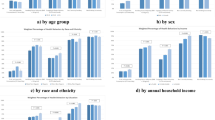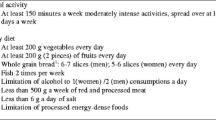Abstract
Background
Approximately 5 million Americans are living with metastatic cancer. Metastatic cancer survivors (MCS) are at risk for poor health behaviors, which may negatively influence well-being.
Methods
Using a modified Dillman protocol, 542 MCS were mailed a survey querying physical and mental health (PROMIS® measures), health behaviors, and supportive care interest. Returned surveys were double-key entered into REDCap®. Data were analyzed using SPSS.
Results
Two hundred seventy-seven surveys were returned (51% response). Respondents (51% female; 88% Caucasian; 12% African-American; Mage = 65 years; Msurvivorship = 38 months; 23% female cancers, 23% melanoma, 21% gastrointestinal, 15% genitourinary, 12% pulmonary, and 6% other) reported low daily fruit and vegetable (F&V) intake (M = 4.1) and weekly minutes of moderate-to-vigorous physical activity (PA) (M = 41.9), with 66% of respondents having overweight or obesity. While mean scores for physical (M = 43.6) and mental (M = 47.7) health were considered “good,” scores in the “fair” to “poor” ranges were observed (40% physical; 23% mental). MCS meeting PA (≥ 150 min per week) and dietary (≥ 5 daily servings of F&V) guidelines reported better physical (p = .003; p = .056) and mental (p = .033, p = .549) health, respectively, compared to MCS who were not. While current supportive care use was low (12%), future interest was high (57%), with greatest interest for nutrition (46%), MCS support group (38%), and gardening (31%).
Conclusions
Our findings suggest that engaging in regular PA and consuming more F&Vs may enhance physical and mental health among MCS. Future research may explore supportive care approaches with high interest, such as gardening, to aid MCS in improving key health behaviors.

Similar content being viewed by others
Data availability
The data for this project are confidential, but may be obtained with a Data Use Agreement with the University of Alabama at Birmingham (UAB). Researchers interested in access to the data may contact the corresponding author.
Code availability
N/A.
References
Fakih MG (2015) Metastatic colorectal cancer: current state and future directions. J Clin Oncol 33(16):1809–1824
Mariotto AB, Etzioni R, Hurlbert M, Penberthy L, Mayer M (2017) Estimation of the number of women living with metastatic breast cancer in the United States. Cancer Epidemiol Biomarkers Prev 26(6):809–815
Edwards BK, Noone AM, Mariotto AB et al (2014) Annual report to the nation on the status of cancer, 1975–2010, featuring prevalence of comorbidity and impact on survival among persons with lung, colorectal, breast, or prostate cancer. Cancer 120(9):1290–1314
Smith MR, Saad F, Chowdhury S et al (2018) Apalutamide treatment and metastasis-free survival in prostate cancer. N Engl J Med 378(15):1408–1418
Moghaddam N, Coxon H, Nabarro S, Hardy B, Cox K (2016) Unmet care needs in people living with advanced cancer: a systematic review. Support Care Cancer 24(8):3609–3622
Bail JR, Traeger L, Pirl WF, Bakitas MA (2018) Psychological symptoms in advanced cancer. Semin Oncol Nurs 34(3):241–251
Meggiolaro E, Berardi MA, Andritsch E et al (2016) Cancer patients’ emotional distress, coping styles and perception of doctor-patient interaction in European cancer settings. Palliat Support Care 14(3):204–211
National Program of Cancer Registries. State cancer profiles. https://statecancerprofiles.cancer.gov. Accessed 25 May 2021
Aly S, Daniel CL, Bae S et al (2021) Cancer-related beliefs and preventive health practices among residents of rural versus urban counties in Alabama. Cancer Prev Res (Phila) 14(5):593–602
Ferrell BR, Temel JS, Temin S, Smith TJ (2017) Integration of palliative care into standard oncology care: ASCO clinical practice guideline update summary. J Oncol Pract 13(2):119–121
Morrison R, Meier D (2019) America’s care of serious illness: a state-by-state report card on access to palliative care in our nation’s hospitals. Center to Advance Palliative Care and the National Palliative Care Research Center. https://reportcard.capc.org/wp-content/uploads/2020/05/CAPC_State-by-State-Report-Card_051120.pdf. Accessed 23 Sept 2021
Murphy S, Wilcox A (2014) Mission and sustainability of informatics for integrating biology and the bedside (i2b2). EGEMS (Wash DC) 2(2):1074
Millar MM, Kinney AY, Camp NJ et al (2019) Predictors of response outcomes for research recruitment through a central cancer registry: evidence from 17 recruitment efforts for population-based studies. Am J Epidemiol 188(5):928–939
Dillman D, Smyth J, Christian L (2009) Internet, mail, and mixed-mode surveys: the tailored design method, 3rd edn. Wiley, Hoboken
Harris PA, Taylor R, Minor BL et al (2019) The REDCap consortium: building an international community of software platform partners. J Biomed Inform 95:103208
Ader DN (2007) Developing the patient-reported outcomes measurement information system (PROMIS). Med Care 45(5):S1–S2
Edwards PJ, Roberts I, Clarke MJ, Diguiseppi C, Wentz R, Kwan I, Cooper R, Felix LM, Pratap S (2009) Methods to increase response to postal and electronic questionnaires. The Cochrane Database of Systematic Reviews (3):MR000008. https://doi-org.ezproxy3.lhl.uab.edu/10.1002/14651858.MR000008.pub4
Thompson FE, Subar AF, Smith AF et al (2002) Fruit and vegetable assessment: performance of 2 new short instruments and a food frequency questionnaire. J Am Diet Assoc 102(12):1764–1772
Hawkes AL, Chambers SK, Pakenham KI et al (2013) Effects of a telephone-delivered multiple health behavior change intervention (CanChange) on health and behavioral outcomes in survivors of colorectal cancer: a randomized controlled trial. J Clin Oncol 31(18):2313–2321
Hahn EA, DeWalt DA, Bode RK et al (2014) New English and Spanish social health measures will facilitate evaluating health determinants. Health Psychol 33(5):490–499
Hays RD, Bjorner JB, Revicki DA, Spritzer KL, Cella D (2009) Development of physical and mental health summary scores from the patient-reported outcomes measurement information system (PROMIS) global items. Qual Life Res 18(7):873–880
Pilkonis PA, Choi SW, Reise SP et al (2011) Item banks for measuring emotional distress from the patient-reported outcomes measurement information system (PROMIS®): depression, anxiety, and anger. Assessment 18(3):263–283
Salsman JM, Lai JS, Hendrie HC et al (2014) Assessing psychological well-being: self-report instruments for the NIH toolbox. Qual Life Res 23(1):205–215
Faul F, Erdfelder E, Buchner A, Lang AG (2009) Statistical power analyses using G*Power 3.1: tests for correlation and regression analyses. Behav Res Methods 41(4):1149–1160
Arem H, Mama SK, Duan X, Rowland JH, Bellizzi KM, Ehlers DK (2020) Prevalence of healthy behaviors among cancer survivors in the United States: how far have we come? Cancer Epidemiol Biomarkers Prev 29(6):1179–1187
Rock CL, Doyle C, Demark-Wahnefried W et al (2012) Nutrition and physical activity guidelines for cancer survivors. CA Cancer J Clin 62(4):243–274
Lauby-Secretan B, Scoccianti C, Loomis D, Grosse Y, Bianchini F, Straif K (2016) Body fatness and cancer: viewpoint of the IARC working group. N Engl J Med 375(8):794–798
Greenlee H, Unger JM, LeBlanc M, Ramsey S, Hershman DL (2017) Association between body mass index and cancer survival in a pooled analysis of 22 clinical trials. Cancer Epidemiol Biomarkers Prev 26(1):21–29
Lennon H, Sperrin M, Badrick E, Renehan AG (2016) The obesity paradox in cancer: a review. Curr Oncol Rep 18(9):56
Behavioral risk factor surveillance system. Centers for disease control and prevention. https://statecancerprofiles.cancer.gov. Accessed 25 May 2021
Zheng Z, Jemal A, Tucker-Seeley R et al (2020) Worry about daily financial needs and food insecurity among cancer survivors in the United States. J Natl Compr Canc Netw 18(3):315–327
Nettle D, Andrews C, Bateson M (2017) Food insecurity as a driver of obesity in humans: the insurance hypothesis. Behav Brain Sci 40:e105
Ligibel JA, Giobbie-Hurder A, Shockro L et al (2016) Randomized trial of a physical activity intervention in women with metastatic breast cancer. Cancer 122(8):1169–1177
Scott JM, Iyengar NM, Nilsen TS et al (2018) Feasibility, safety, and efficacy of aerobic training in pretreated patients with metastatic breast cancer: a randomized controlled trial. Cancer 124(12):2552–2560
Tsianakas V, Harris J, Ream E et al (2017) CanWalk: a feasibility study with embedded randomised controlled trial pilot of a walking intervention for people with recurrent or metastatic cancer. BMJ Open 7(2):e013719
Kartolo A, Cheng S, Petrella T (2016) Motivation and preferences of exercise programmes in patients with inoperable metastatic lung cancer: a need assessment. Support Care Cancer 24(1):129–137
Ten Tusscher MR, Groen WG, Geleijn E et al (2019) Physical problems, functional limitations, and preferences for physical therapist-guided exercise programs among Dutch patients with metastatic breast cancer: a mixed methods study. Support Care Cancer 27(8):3061–3070
Blair CK, Morey MC, Desmond RA, Cohen HJ, Sloane R, Snyder DC, Demark-Wahnefried W (2014) Light-intensity activity attenuates functional decline in older cancer survivors. Med Sci Sports Exerc 46(7):1375–1383
George SM, Alfano CM, Groves J et al (2014) Objectively measured sedentary time is related to quality of life among cancer survivors. PLoS One 9(2):e87937
Bail JR, Frugé AD, Cases MG et al (2018) A home-based mentored vegetable gardening intervention demonstrates feasibility and improvements in physical activity and performance among breast cancer survivors. Cancer 124(16):3427–3435
Demark-Wahnefried W, Cases MG, Cantor AB et al (2018) Pilot randomized controlled trial of a home vegetable gardening intervention among older cancer survivors shows feasibility, satisfaction, and promise in improving vegetable and fruit consumption, reassurance of worth, and the trajectory of central adiposity. J Acad Nutr Diet 118(4):689–704
Kelly BJ, Fraze TK, Hornik RC (2010) Response rates to a mailed survey of a representative sample of cancer patients randomly drawn from the Pennsylvania Cancer Registry: a randomized trial of incentive and length effects. BMC Med Res Methodol 10:65
Smith T, Stein KD, Mehta CC et al (2007) The rationale, design, and implementation of the American Cancer Society’s studies of cancer survivors. Cancer 109(1):1–12
Ihrke DK, Faber CS (2012) Geographical mobility: 2005 to 2010. US Department of Commerce, Economics and Statistics Administration, US Census Bureau. https://www.census.gov/content/dam/Census/library/publications/2012/demo/p20-567.pdf. Accessed 23 Sept 2021
Petrillo LA, Traeger LN, Sommer RK, Zhou AZ, Temel JS, Greer JA (2021) Experience and supportive care needs of metastatic lung cancer survivors living with uncertainty: a brief qualitative report. J Cancer Surviv 15(3):386–391
Funding
The study was funded by a grant from the University of Alabama at Birmingham (UAB) Health Disparities Research Education Program Pilot Project Award (no assigned number; PI: J. Bail). Authors were supported by additional funding: Cancer Prevention and Control Training Program (T32-CA047888) (J. Bail), Cancer Research Experiences for Students (CaRES) Program (5R25CA076023) (J. Cagle), and Cancer Research Immersion Student Program (U54 CA118948) (K. Tiesi, J. Caffey).
Author information
Authors and Affiliations
Contributions
Jennifer R. Bail: conceptualization, methodology, funding acquisition, project administration, investigation, data curation, writing—original draft. Sumanth Bail: data curation, visualization, writing—review and editing. Jessica Cagle: data curation, visualization, writing—review and editing. Koriann Tiesi: data curation, visualization, writing—review and editing. Jayla Caffey: data curation, visualization, writing—review and editing. Marie Bakitas: methodology, funding acquisition, writing—review and editing. Wendy Demark-Wahnefried: methodology, funding acquisition, writing—review and editing.
Corresponding author
Ethics declarations
Ethics approval
Study protocol received approval from the University of Alabama at Birmingham (UAB) Institutional Review Board (IRB-300002317).
Consent to participate
An IRB approved study information sheet was mailed along with the study survey (UAB IRB-300002317). Participant consent was implied through voluntary completion of the study survey.
Consent for publication
An IRB approved study information sheet was mailed along with the study survey (UAB IRB-300002317). Participant consent was implied through voluntary completion of the study survey (UAB IRB-300002317).
Conflict of interest
The authors declare no competing interests.
Additional information
Publisher's note
Springer Nature remains neutral with regard to jurisdictional claims in published maps and institutional affiliations.
Rights and permissions
About this article
Cite this article
Bail, J.R., Bail, S.V., Cagle, J. et al. Health behaviors and well-being among those “living” with metastatic cancer in Alabama. Support Care Cancer 30, 1689–1701 (2022). https://doi.org/10.1007/s00520-021-06583-1
Received:
Accepted:
Published:
Issue Date:
DOI: https://doi.org/10.1007/s00520-021-06583-1




